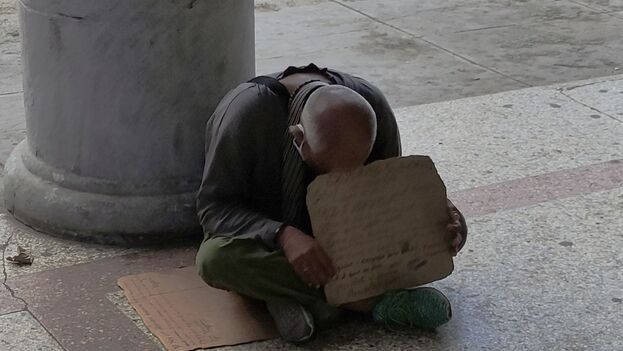
![]() 14ymedio, Madrid, 12 May 2023 — In 2022, wages in Cuba rose an average of 9.4% compared to the previous year, while the cost of living increased by 39% according to the official data and around 140% if we look at the informal market. The result is a brutal deterioration of the purchasing power of Cubans, with an average monthly salary of 4,219 pesos [$175] when a pound of rice is 150 pesos [$6.25] in the “liberated” [i.e. unrationed] market.
14ymedio, Madrid, 12 May 2023 — In 2022, wages in Cuba rose an average of 9.4% compared to the previous year, while the cost of living increased by 39% according to the official data and around 140% if we look at the informal market. The result is a brutal deterioration of the purchasing power of Cubans, with an average monthly salary of 4,219 pesos [$175] when a pound of rice is 150 pesos [$6.25] in the “liberated” [i.e. unrationed] market.
The National Office of Statistics and Information (Onei) has made public the annual salary data for 2022. In the document you can see the brutal rise that occurred with the so-called Ordering Task* in 2021, when the average Cuban went on to earn 3,854 pesos [$160] compared to 1,194 [$50] in 2020, while the prices of goods and services also multiplied. Very soon, in addition, it was found that the forecasts fell short and the cost of the ’basic basket’ even tripled.
The official change is another factor that reduces the apparent salary increase of the last year to a minimum. Since the rate became 1 dollar for 120 pesos, the average salary is reduced to only 35 dollars or, even worse, to about 20 dollars in the foreign exchange black market.
Although the differences by provinces are not very significant, Havana is the territory where workers are best paid, with 4,689 pesos [$195] on average. The second on the list, with 4,239 pesos [$177] is neighboring Artemisa, and in third position is Holguín, where the average is 4,159 pesos [$173]. That data could be related to the sector. Mining — abundant in that province, where the Canadian Sherritt exploits nickel and cobalt — is the best paid, with 7,061 Cuban pesos [$294] on average. And, in the case of Artemisa, the salaries paid in the Mariel Special Development Zone would explain the position of that province at the top of the classification.
Electricity, water and gas are the second best paid sector, with 5,509 pesos [$230] per month, ahead of science and innovation, apparently more specialized and where about 5,246 pesos [$219] per month are received. The list of salaries by activity shows the loss of value of two sectors that until recently were considered priorities, Health (4,127 pesos) [$172] and Education (4,109 pesos) [$171].
Both are far below the workers in the business services sector, real estate activities and rentals, who earn an average of 5,069 pesos [$211] per month. It is the third in order of best paid, and the one to which the Cuban Government allocates the largest amounts of investment, much higher proportionally in relation to the salary.
It is also striking that trade and repair workers are the worst paid, with 3,497 pesos [$146] on average. The third in line — the second is that of Communal Services workers — is one of the sectors that is becoming increasingly necessary in the country, that of food production, although in this case a very international pattern is repeated. The farmers earn an average of 3,686 pesos [$154], a very poor incentive to have the food security of the Island in their hands.
As for the geographical location of those who earn the least, Santiago de Cuba, the eastern capital, is the province with the worst salaries: 3,824 pesos [$159] per month.
The official data, especially if a comparison is measured with the cost of living and the exchange rate of the country’s hard currency (the dollar), confirm not only the perception of national and foreign citizens. They also agree with the report made that same year – 2022 – by the Cuban Observatory for Human Rights (OCDH), based in Madrid, which placed the number of Cubans living below the poverty line at 72%.
In addition, the figures reveal dependence on the outside, creating a radical division among citizens based on whether or not they have access to remittances.
*Translator’s note: The Ordering Task is a collection of measures that include eliminating the Cuban Convertible Peso (CUC), leaving the Cuban peso as the only national currency, raising prices, raising salaries (but not as much as prices), opening stores that take payment only in hard currency, which must be in the form of specially issued pre-paid debit cards, and a broad range of other measures targeted to different elements of the Cuban economy.
Translated by Regina Anavy
____________
COLLABORATE WITH OUR WORK: The 14ymedio team is committed to practicing serious journalism that reflects Cuba’s reality in all its depth. Thank you for joining us on this long journey. We invite you to continue supporting us by becoming a member of 14ymedio now. Together we can continue transforming journalism in Cuba.
